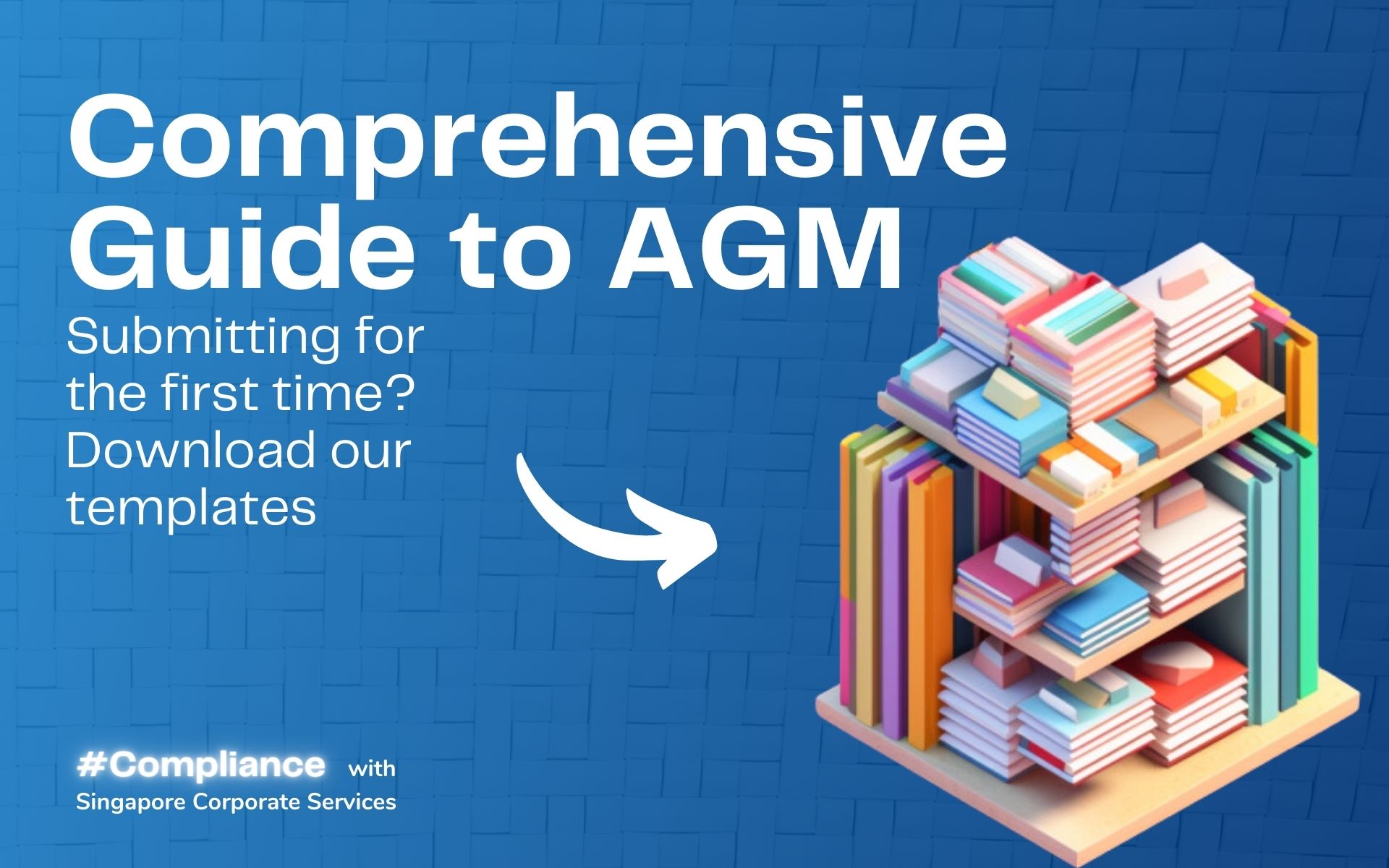AGM Requirements in Singapore
What are the key regulatory requirements for holding an AGM in Singapore?
All Singapore private limited companies with financial year ending before 31 August 2018 are required to hold their first Annual General Meeting (“AGM”) within 18 months from the date of their incorporation, and thereafter not more than 15 months from the date of the previous AGM (*once within a calendar year).
For companies with a financial year ending on or after 31 August 2018, listed companies must hold an AGM within four months after their financial year end and file the annual return within five months after the financial year end, and non-listed companies must hold an AGM within six months after their financial year end and file the annual return within seven months after the financial year end.
During the AGM, the shareholders have the opportunity to raise any queries regarding the financial position of the Company, and Members (shareholders with voting rights) can vote on annual and current business matters such as:
- Approval and adoption of Financial Statements/Audit Report
- Appointment/Reappointment of Directors
- Approval of Directors’ Fees/Remuneration
- Final Dividend Declaration
- Reappointment of the Auditor & Approval of the Auditor’s professional Fees
If you’re a small business, you may not need to hold an AGM (but you still need to comply with documentation and reporting)
A Singapore private limited Company may now choose to dispense with the holding of its AGM, settling all its AGM-related matters through written resolutions instead, provided that all the Members (voting shareholders) of the Company have agreed to the dispensation of the AGM by way of a resolution.
A Company that has dispensed with the holding of its AGM will still be obliged to attend to the same matters that are usually dealt with at AGMs, including circulating a set of signed financial statements/audit report and accompanying AGM-related resolutions to the shareholders within six months’ from the financial year end.
If you’re still uncertain if this applies to you, you can always reach out to us.
Do it yourself
You can fulfil and file your AGM requirement if you have been appointed as the corporate secretary for your company. In this article, you can download some templates to file them yourself by adding your own company header.
These are some of the documents you need to maintain as a corporate secretary.
- Registers
- AGM documents
- Directors Resolution in Writing
Register
As a company secretary of a Pte Ltd company, you have to maintain the registers stated below. You have to prepare board resolutions, minutes of meeting, notice of AGM and more.
- Register of Applications and Allotments
- Register of Auditors
- Register of Directors’ Shareholdings
- Register of Directors
- Register of Managers
- Register of Members and Share Ledger
- Register of Registrable Controllers
- Register of Secretaries
Most notably, you will need to maintain the Register of Registrable Controllers. According to ACRA, this is the penalty for not maintaining a register of registrable controllers of up to S$5,000.
Annual General Meeting (AGM)
Before the AGM
You will need to prepare a Notice of AGM at least 14 days in advance before the AGM itself. Can’t make it at least 14 days? You can prepare consent to shorter notice for the members of the company to approve.
During the AGM
You will need to prepare minutes and resolutions of the meeting. Both directors and shareholders are able to make resolutions. For more on resolutions, you can refer to this article by the Singapore Legal Advice. I find the article very useful.
After the AGM
You will need to file the annual returns to ACRA. The deadline to file the annual returns depends on whether you have a listed or unlisted company. For listed companies, the deadline is five months after your financial year-end. For unlisted companies, the deadline is seven months after your financial year-end.
Download The Templates For AGM
Directors’ Resolution In Writing
The Directors’ resolution can be used for all types of resolutions that your company might have. Typically, a directors’ resolution include:
- Declaration of Dividends
- Appointing and removal of Directors
- Bank account opening and closing
- Directors’ loans
- Approval of large business investments
- Allotting new shares
- Adopting the financial statements
Here are more Directors’ resolution templates you can download:
- Change of registered address
- Change of bank authorised signatories
- Change of Company’s principal activity
- Registration of CorpPass
- Change of Company Secretaries
Skip the hassle – Use a professional corporate service
We encourage business owners and compliance managers to outsource their accounting, ACRA and IRAS filing requirements to a Professional Corporate Secretary service so that they can focus more on the operations.
Filling up and filing these records can take between half a day to 3 days depending on your organisation size. There are also other troubleshooting and coordination with the registers that are common with these processes. These regulations also have exemptions that may apply for your business too.
While we understand that not all businesses are able to use a professional service, most should in order to save manhours and prevent costly oversights – especially for first timers.
Need help or a quote?
Our friendly team is here for any of your needs.
You can always reach us at our contact form or call us today at +65 6914 1113
Singapore Corporate Services is a Singapore based CPA firm with over 20 years of combined experience. SCS provides professional bookkeeping and accounting outsource services, company and personal income tax, goods and services tax (GST), payroll, company incorporation and other compliance professional services.
How to Change Your Company Name in Singapore
A company's name can significantly shape its identity, yet there are times when a change becomes...
Is Singapore a Tax Haven? A Comprehensive Analysis
Is Singapore really a tax haven, or is it simply capitalising on tax policies that spur economic...
Fiscal Year vs Financial Year: Definitions and Implications
Is there a difference between a fiscal year and a financial year? While they both refer to the...




